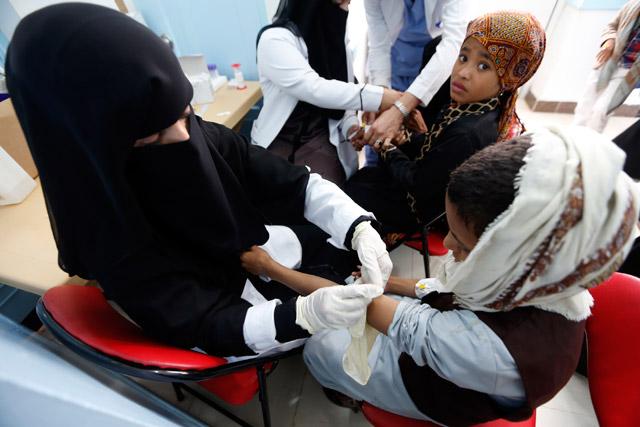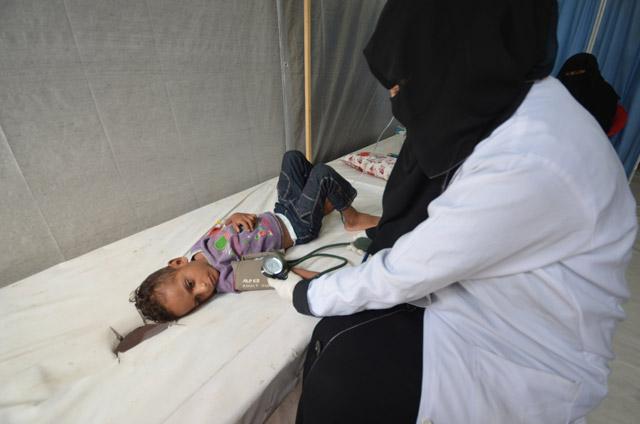You are here
Yemen insurgents declare state of emergency over cholera outbreak
By AFP - May 15,2017 - Last updated at May 15,2017

A Yemeni child, suspected of being infected with cholera, receives treatment at a hospital in Sanaa on Monday (AFP photo)
SANAA — Insurgency leaders in Yemen's capital have sounded the alarm over a spreading cholera outbreak that has killed dozens in the war-torn country, calling for urgent international assistance.
The Huthi-run health ministry said cases of cholera had worsened and that it was "unable to contain this disaster", in a statement carried overnight by the rebels' Saba news agency.
It launched an appeal for help from international humanitarian organisations to deal with the crisis.
Hafid Bin Salem Mohammed, an insurgency leader, said the "scale of the disease is beyond the capacity" of his department, in a statement on Huthi-run Al Masira television.
The International Committee of the Red Cross (ICRC) said on Sunday the cholera outbreak has killed 115 people and left 8,500 ill between April 27 and Saturday.
The state of emergency is an "indication of how serious this crisis is", United Nations humanitarian coordinator in Yemen Jamie McGoldrick told reporters on Monday.
"This rapid outbreak of cholera is just another dire manifestation of the humanitarian catastrophe that faces this country," he said.
"These numbers will increase in the weeks and months ahead," McGoldrick warned.
France said on Monday it was "preoccupied by the rapid spread" of cholera, pledging two million euros ($2.2 million) to support programmes "responding to the extremely urgent needs" in Yemen, mainly in the health sector.
"It is more than ever urgent to find a political solution in Yemen, the only way possible to end the suffering of the population," the French foreign ministry said in a statement.
International relief agencies on Sunday warned of a catastrophic humanitarian situation and urged citizens to exercise hygiene precautions.
Patients under trees
Dominik Stillhart, the director of operations at the ICRC, said Yemen was "facing a serious outbreak of cholera".
Doctors Without Borders expressed fears that health authorities alone would not be able to deal with the outbreak.
It called on international organisations to "scale up their assistance urgently to limit the spread of the outbreak and anticipate potential other ones".
This is the second outbreak of cholera, a bacterial infection contracted through ingesting contaminated food or water, in less than a year in Yemen, the Arab world's poorest country.
At the Sabaeen hospital in Sanaa, deputy director Nabeel Al Najjar said the understaffed medical facility was struggling to cope with the high influx of patients.
The hospital, which lacks medicines, is receiving between 150 to 200 patients with cholera symptoms a day, he said.
"We are putting four patients in each bed, and have placed extra beds in tents and under the trees in the garden," he told AFP, adding rain had then complicated the arrangements.
Twenty-five districts in 11 governorates have been affected in the past four weeks, McGoldrick said, with more than 50 other districts at risk.
"It's very likely that the numbers are very underrepresented because... over 50 per cent of the health facilities in this country are no longer functioning," he said.
The World Health Organisation now classifies Yemen as one of the worst humanitarian emergencies in the world alongside Syria, South Sudan, Nigeria and Iraq.
The United Nations has warned 17 million people — equivalent to two-thirds of the population — are at imminent risk of famine in Yemen.
Related Articles
SANAA — A cholera outbreak has rapidly spread in Yemen, killing 115 people in two weeks in the impoverished country where hospitals badly da
GENEVA — Yemen's growing cholera epidemic may accelerate looming famine, as limited resources are shifted away from malnutrition and other p
GENEVA — The medical charity Medecins Sans Frontieres (Doctors Without Borders, MSF) is closing most of its 37 cholera treatment centres in

















